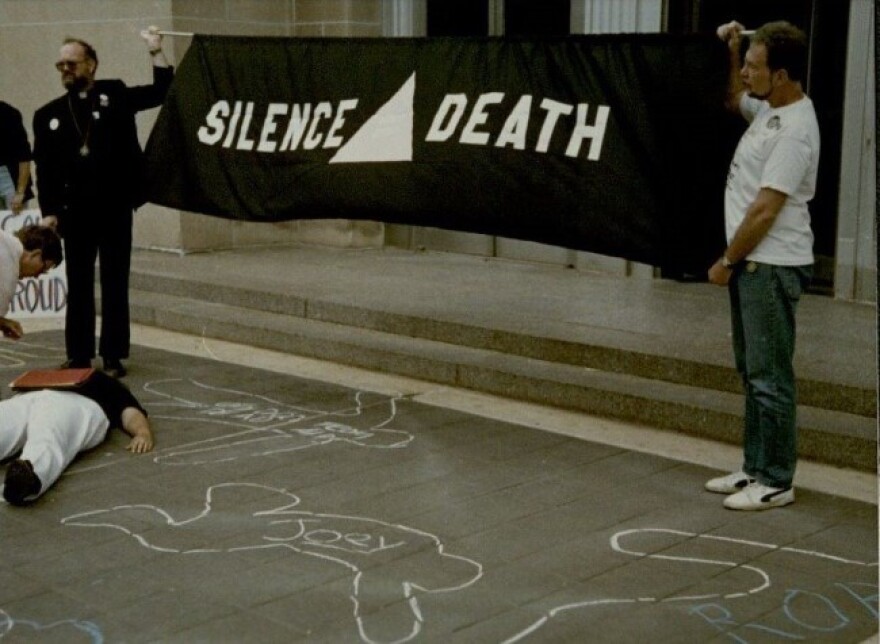Recent news out of Johnson County, Kansas, has been about cities adopting non-discrimination ordinances with protections for members of the LGBTQ community.
The debate in those cities has been timely, but it’s a conversation Kansas City, Missouri, went through more than 25 years ago – and many of the aspects have been similar. That becomes strikingly clear in a documentary film called “The Ordinance Project,” released last year by Austin Williams, a UMKC doctoral student.
Williams used archival footage to capture heated exchanges at City Hall, as gay-rights and AIDS activists fought for services and discrimination protection in the late 1980s before Kansas City, Missouri, passed an ordinance in 1993.
Williams secured access to that archival footage partly through the help of the Gay and Lesbian Archive of Mid-America (GLAMA), a growing collection of memorabilia, documents, AIDSWalk T-shirts, scrapbooks, artwork, photos, publications, playbills, and other materials donated by people from the Kansas City area.

Projects like Williams’ have been an “unanticipated delight” of having the GLAMA collection preserved and catalogued at the Miller Nichols Library at the University of Missouri-Kansas City, said Stuart Hinds, curator of the library’s special collections and archives.
“Students and other community researchers have taken this material and looked at it in ways that I never would have anticipated,” says Hinds.
As the archive celebrates its 10th anniversary with an exhibit in the library’s gallery space through next March, Hinds said “the response from the community has far exceeded our expectations.” One thing he didn’t expect, Hinds said, is the rate at which people in the community would donate materials.
That means researchers can find a treasure trove of records about activism and gatherings in Kansas City that helped launch the national gay rights movement. The archive includes extensive information and scholarly examinations about the nightclubs and bars that were central to the city’s gay life and culture, such as the vibrant drag scene of the 1960s and 1970s, which featured female impersonators who were part of the national circuit.
“You’ve got a really active social scene in large part centered around female impersonation,” Hinds said, noting that the Jewel Box Lounge, located in the 1960s at 3200 Troost, was known nationally and had performers such as Skip Arnold who were community leaders. Hinds said Truman Capote even brought people from western Kansas to the Jewel Box while he was working on his classic book, “In Cold Blood.”

But Kansas City’s early role in the country’s LGBT movement wasn’t all about entertainment.
In February 1966, Kansas City hosted the first national gathering of gay and lesbian civil rights leaders. Various organizations had formed on the coasts and in a few other cities since the 1950s, but they were scattered and not well funded. Leaders decided to meet in Kansas City, a central location that had an active gay social scene.
They met at the State Hotel at 12th and Wyandotte and began a process to organize and coordinate their efforts. It was largely successful, Hinds said, but also exposed tensions typical of many social change movements.
“Tensions between people who are much more confrontational and people who wanted to be much more assimilationist,” he noted.
After the Stonewall riots of 1969, college students began forming gay liberation clubs in the early 1970s. Students at the University of Missouri in Columbia and at UMKC sought official recognition from the Board of Curators for their chapters, but were denied. So they sued in 1973. The students won on appeal and the university appealed again to the U.S. Supreme Court, which declined to take up the case.
“The lower court ruling in favor of the students stood,” Hinds said, “and set the precedent for recognition of these kinds of groups at colleges and universities across the country.”
Hinds said he’s always interested to see how people make use of the collection. The archive, he said, is vital to providing a more comprehensive and inclusive perspective on the life and history of Kansas City.
Stuart Hinds, curator of special collections and archives for the Mille Nichols Library at the University of Missouri-Kansas City, spoke with KCUR 89.3 on a recent edition of Up To Date. Listen to the conversation here.
KCUR is licensed to the University of Missouri Board of Curators and is an editorially independent community service of the University of Missouri-Kansas City.
Lynn Horsley is a freelance journalist and was a veteran reporter for The Kansas City Star. Follow her on Twitter @LynnHorsley.





